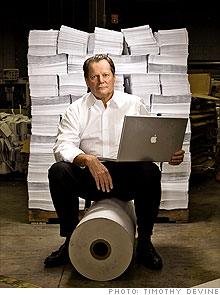E-document vendors' paperless profits
New SEC rules are a boon to one document-delivery company.
 |
| NewRiver CEO Russ Planitzer |
(Fortune Small Business) -- Say good-bye to the piles of paper that arrive in the mail anytime you buy shares of a stock, bond or mutual fund.
Such documents have flooded the postal system since disclosure laws were passed after World War II and now cost companies a total of $1 billion a year. But as of this year, the SEC allows companies to send a summary e-mail with Web links to the full version.
That's great news for NewRiver, an electronic-document-management company based in Andover, Mass. NewRiver started digitizing financial statements back in the late 1990s - first onto CDs, then on the Web. The company soon became a leader in the field, with $30 million in revenue in 2008.
Financial records companies such as RR Donnelley and Broadridge (BR) have also moved their offerings online. But NewRiver was the first to aggregate all government securities information - ironically, in a vast real-world warehouse where paper sources can be cross-referenced, kept up to date and checked for accuracy. The company's patented record-tracking procedures took more than 10 years to perfect.
"The patents mean they are positioning themselves to be the single electronic source for distributing financial information," says Peter Delano, research director at TowerGroup, a research firm in Needham, Mass.
Financial services companies spend an average of $1 per paper document per deal, according to NewRiver, so they're eager to go digital.
"The average investment firm does a million transactions a year," says NewRiver CEO Russ Planitzer, 64. "That's a million dollars that investors get to keep."
And a lot of trees that get to live. ![]()
-
The Cheesecake Factory created smaller portions to survive the downturn. Play
-
A breeder of award-winning marijuana seeds is following the money and heading to the U.S. More
-
Most small businesses die within five years, but Amish businesses have a survival rate north of 90%. More
-
The 10 most popular franchise brands over the past decade -- and their failure rates. More
-
These firms are the last left in America making iconic products now in their twilight. More











